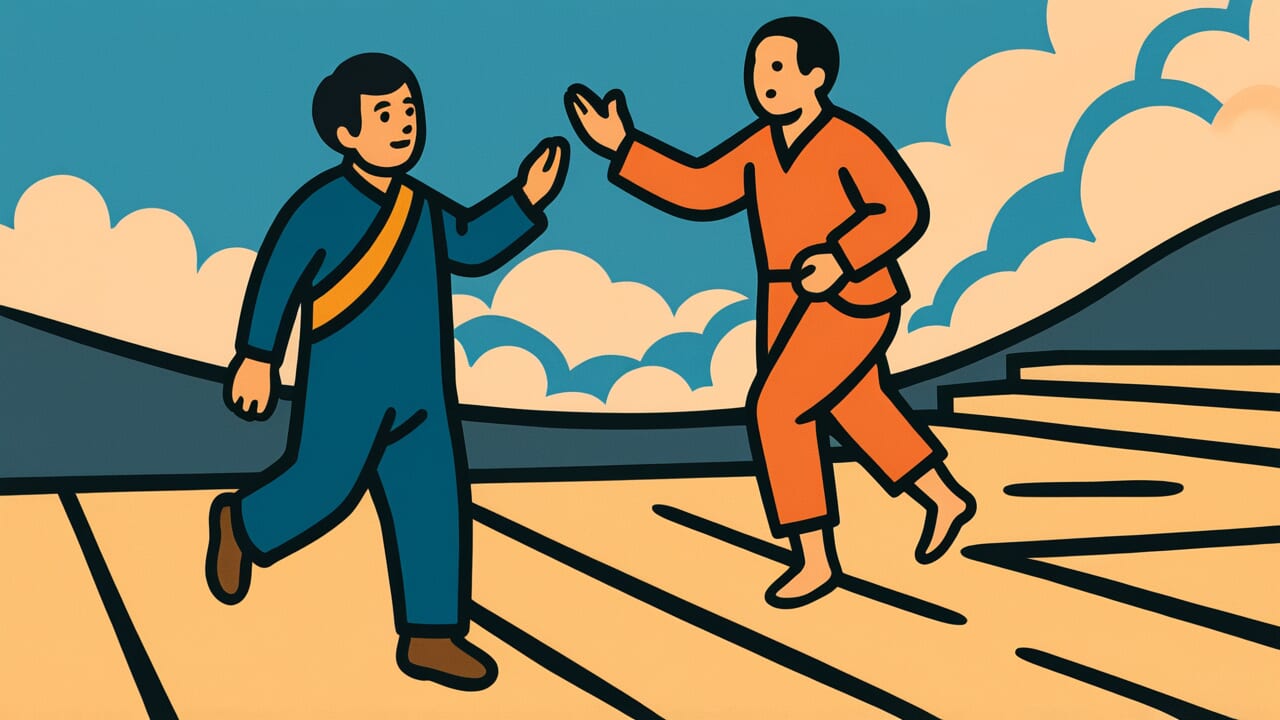How to Read “Do not make Goujian’s hardships meaningless, for there may be a Fan Li even now”
Ten Kusen wo munashū suru koto nakare, toki ni Han Rei naki ni shimo arazu
Meaning of “Do not make Goujian’s hardships meaningless, for there may be a Fan Li even now”
This proverb teaches two political truths. You should not easily abandon a ruler or leader in difficult times. But at the same time, wise people know when to step away.
The first part, “Do not make Goujian’s hardships meaningless,” teaches loyalty. You should not abandon your lord during hard times. You should remain faithful and supportive.
The second part, “for there may be a Fan Li even now,” adds wisdom. Sometimes, like Fan Li, it is smart to leave at the right moment. This exists too.
This proverb is not about blind loyalty. It also values the wisdom to judge situations carefully. In politics and organizations, balancing loyalty and wise judgment is both difficult and important.
This saying contains deep insight. It shows the complexity of human relationships in positions of power.
Origin and Etymology
This proverb comes from a story in ancient China during the Spring and Autumn period. King Goujian of Yue was defeated by King Fuchai of Wu. He suffered humiliating surrender.
But Goujian had a wise advisor named Fan Li. With Fan Li’s help, Goujian endured years of hardship. He slept on firewood and tasted bile to remember his shame. Eventually, he destroyed Wu and achieved revenge.
However, Fan Li understood Goujian’s character deeply. The king was reliable during hard times. But after victory, he became suspicious and would eliminate his successful ministers.
So Fan Li disappeared right after the victory. He became a merchant and lived out his life peacefully. This showed his wisdom.
The proverb carries this double meaning. “Do not abandon a lord like Goujian. But when the time comes, there are also wise people like Fan Li who leave.”
In Japan, this saying spread during the Edo period. Scholars who studied Chinese classics used it. It was valued for balancing loyalty with the wisdom to protect oneself.
Usage Examples
- The company is struggling, but remember: Do not make Goujian’s hardships meaningless, for there may be a Fan Li even now. We must calmly assess the situation.
- Do not make Goujian’s hardships meaningless, for there may be a Fan Li even now. But is now the time to support or the time to step back? It’s hard to judge.
Universal Wisdom
This proverb reveals a universal truth about human relationships. It addresses the eternal conflict between loyalty and self-preservation. These two values often oppose each other.
We want to support others. We want to stand by them during difficult times. This is a beautiful human quality. But we also need to protect our own lives. We need the judgment to know when to step back.
This proverb has survived through centuries because this conflict is timeless. Loyalty to a company. Obligation to friends. Devotion to family. Every day we face these questions. How much should we give? When should we withdraw?
Beautiful loyalty alone cannot protect you. But calculating judgment alone cannot build relationships. Neither extreme works.
Our ancestors understood something important. These two values are not contradictory. Understanding both is true wisdom. Support fully when you should support. But judge calmly when situations change.
This flexibility is the wisdom for living a long life. The essence of human relationships may lie in this delicate balance.
When AI Hears This
Game theory shows something interesting. Winners become most vulnerable at “the moment they are certain of victory.” Why? Because winners optimize their strategy assuming the opponent’s defeat. They reduce their preparation for reversal scenarios to nearly zero.
The winner’s alertness decreases exponentially over time. But the loser’s possibility of reversal stays above a certain level. This asymmetry creates a moment when the two lines cross.
Information asymmetry plays a role too. The loser knows “I haven’t given up yet.” But the winner tends to underestimate this. Behavioral economics research shows something striking. Right after success, people’s cognitive bias maximizes. Their risk assessment ability drops to about 60 percent of normal levels.
While King Goujian slept on firewood remembering his humiliation, King Fuchai was in this cognitive blind spot. He couldn’t see the danger.
What’s more interesting is this. Resources needed for reversal are not “accumulated from zero.” They are “rediscovered existing resources that were overlooked.” Strategists like Fan Li excel at identifying potential resources even in defeat.
This is the same structure as modern startups defeating large corporations. If you secure information advantage, the difference in resources is not necessarily decisive.
Lessons for Today
This proverb teaches modern people about “flexible judgment” in relationships. If you are supporting someone now, that is wonderful. Standing by someone during hard times is one of the most noble human qualities.
But at the same time, do not forget to value yourself. This is equally important.
In modern society, many people suffer from excessive devotion to companies. Many struggle with one-sided relationships. This proverb does not tell you to choose between loyalty and self-preservation. It teaches the importance of having both perspectives.
Support fully when you should support. But when the situation changes and you are only being drained, you need courage to step back. This is not betrayal. It is wisdom.
What matters is having eyes to assess situations calmly. Do not rush forward on emotion alone. Do not move on calculation alone. Make the best judgment for each moment.
This is the wisdom for living a long, healthy life. Your life is something you yourself must protect. Remember this truth.



Comments